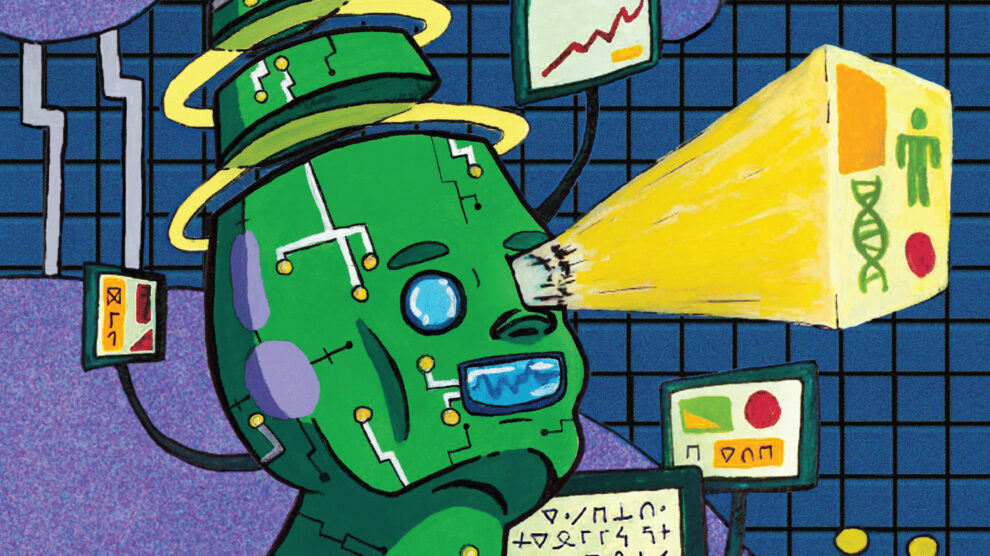From Rural China, a Fresh Critique of Global Capitalism
By Sigrid Schmalzer
Volume 24, Number 2, Don’t Be Evil
 The first time I heard of Xiaowei Wang was because of a project called FLOAT Beijing. In 2012, Wang and a collaborator organized local kite-flying enthusiasts in Beijing to rig their kites with sensors that would turn different colors depending on the level of air pollution, thus providing a colorful and more truthful reporting mechanism than what is often available from official agencies. This remains one of my favorite examples to share with students in my college class on science and society in modern China: it resonates beautifully with the mass-based, politically engaged, DIY tech legacy of the Mao era and shows how that legacy can be tapped to organize around politically sensitive subjects today. When I heard Wang had written a book on tech in rural China, I knew I had to read it. Pitched to a Western audience, Blockchain Chicken Farm offers a picture of global capitalism from the vantage point of Chinese rural communities—a project just as subversive in its own way as FLOAT Beijing was.
The first time I heard of Xiaowei Wang was because of a project called FLOAT Beijing. In 2012, Wang and a collaborator organized local kite-flying enthusiasts in Beijing to rig their kites with sensors that would turn different colors depending on the level of air pollution, thus providing a colorful and more truthful reporting mechanism than what is often available from official agencies. This remains one of my favorite examples to share with students in my college class on science and society in modern China: it resonates beautifully with the mass-based, politically engaged, DIY tech legacy of the Mao era and shows how that legacy can be tapped to organize around politically sensitive subjects today. When I heard Wang had written a book on tech in rural China, I knew I had to read it. Pitched to a Western audience, Blockchain Chicken Farm offers a picture of global capitalism from the vantage point of Chinese rural communities—a project just as subversive in its own way as FLOAT Beijing was.
Through a blend of historically informed journalism, travel writing, family memoir, political analysis, philosophical reflection, and speculative fiction, Wang traverses landscapes of the “embodied internet.” And so we learn that blockchain chicken farms are real places, where chickens wear Fitbit-like anklets that track their activity for the benefit of the wealthy urban consumer of high-end organic food. Other places we travel include an AI-enhanced pig farm struggling against swine fever, the buffet table at a conference for agricultural drone operators, the police station in an urban district home to rural migrants, a mountain village that just gained its first paved road to the outside world and is now selling organic eggs over the internet, AI conferences in self-proclaimed centers of US high technology, countless cafes and noodle shops, a coastal village that raises oysters for the international pearl market, and Wang’s home in California where they tune into livestreamed “pearl parties” hosted by white American women desperately trying to offload the Chinese pearls they have purchased through Amway-type (multi-level marketing) corporations in the US.
With roots in both the US and China, Xiaowei Wang moves across these terrains skillfully, though perhaps not with ease, since Wang is always probing the sore places of inequity and alienation. While the voices at the heart of the book are those of everyday Chinese people, Wang also frequently engages with radical American thinkers like Grace Lee Boggs, James Boggs, and bell hooks. The US and China stand frequently in juxtaposition, but there is no othering here; the theme throughout is interconnection. And so we find Chinese police learning surveillance techniques from the LAPD in an effort to become more modern (or “United States-like”), while Etsy crafters sew boutique items with cloth made in China. And we learn that, not unlike their Chinese counterparts, Americans involved in direct selling are engaged in a “kind of desperate grab at survival” (p. 222). The feeling of interconnection comes to a head when Wang, back in the US, finds on Amazon the very Snow White costume that they saw manufactured in a “Taobao village” (the rural e-commerce arm of Chinese tech giant Alibaba). They describe the sensation, simultaneously moving and uncomfortable, as “a disconnect in my personal perception of scale and distance… a brief flash of familiarity in a global economy that requires namelessness” (p. 191).
In sharing these stories, Xiaowei Wang is consistently performing two important spatial corrections as they move rural life and China itself out of the margins and into the center of analysis. First, they explicitly commit themself to challenging “metronormativity”—that is, the cultural assumptions of urban people and the hierarchical expectations, embraced by urban and rural people alike, that place rural society at the bottom. And just as important, they confront anti-Chinese racism in the US, which equates “made in China” with trash and continues to question whether China is capable of becoming a center of innovation. (The racism of this characterization is still more apparent when we consider how it endures even alongside the contradictory, but still racist, anxieties about looming Chinese dominance in tech.) To upend these assumptions, Wang heads into what are known as shanzhai villages—literally “mountain strongholds”; figuratively the imitations people in such places produce for the consumer market, which are commonly disparaged as “piracy” but which Wang and others are reclaiming as artful innovation. There, Wang finds inspiration for an alternative future in which the definition of innovation embraced by venture capitalists is replaced by values emerging from Chinese villages collectively engaged in developing new technologies. In reimagining the future, Wang is effecting not just a spatial reorientation, but also a temporal realignment. As such, it is fitting that they include in the book three interludes of Sinofuturist speculative fiction—each a literal recipe for an ambiguous technological future built on Chinese food culture.
The US and China stand frequently in juxtaposition, but there is no othering here; the theme throughout is interconnection.
Blockchain Chicken Farm abounds with sharp criticism of the global capitalist order, and Wang is also free with their critique of political authoritarianism. But the criticism is tempered always with compassion and understanding for the people (including me, you, and themself) seduced by techno-optimism and enmeshed in the economic and political dilemmas of our era. And lest any reader slip down the slope of critique into Sinophobia, Wang is always reminding us that the US is not immune, that the problems of food safety and other urgent concerns are not easily solved without state intervention, and that the surveillance state (while unquestionably oppressive, whether in China or the US) is produced through real, relatable people at the grassroots.
At bottom, Wang’s is a human quest, and Blockchain Chicken Farm is a radically humanist book. When asked by a villager, “Why are you here?”, Wang reflects and concludes, “I am here because looking at technology in rural China, in places that produce the technology we use, places that show how globally entangled we are with one another, allows me to confront the scarier question that technology poses: What does it mean to live, to be human right now” (p. 7)? A big question, to be sure, and one that a single book can’t hope to answer. But among rural Chinese people, and drawing also from radical US activists of color, Wang puts some important pieces together and generously shares their findings with us.
One of my favorite stops on Wang’s journey comes at a food stall in Guiyang, where an overheard conversation prompts Wang to reflect upon the pleasure of “a commitment to the path of living as life unfolds… not against but with the spectre of frailty, failure, and death.” They contrast the willingness to accept such uncertainty with the “optimization” that neoliberal technocracy pushes us to embrace, but which is highly improbable and in any case runs counter to fundamental human desires for a meaningful life: “This commitment is a naked pleasure that exists under the ever-shifting, open space of change, palpable against the hungry, narrow world of optimization. It would be impossible to optimize life for these kinds of joy. Such pleasure cannot exist in a fully optimized world” (p. 79). Wang’s insights arise directly from their rejection of metronormativity and respect for the tech of Chinese farmers: “For thousands of years, the work of these farmers has been stewarding and maintaining the earth, rather than optimizing agricultural production… laying a foundation for healthy soils and rich ecology in an uncertain future. They commit to the path of uncertainty” (pp. 94-95).
No doubt you will find your own favorite spots in this rich and deep book on technology and human life in China’s countryside and beyond.
Note: Xiaowei Wang is the creative director at Logic magazine and a Ph.D. student in geography at the University of California, Berkeley.
Blockchain Chicken Farm and Other Stories of Tech in China’s Countryside
Xiaowei Wang
New York: FSG Originals
2020
256 Pages





